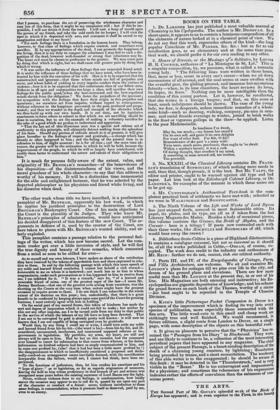The other work whose title we have inscribed, is a
posthumous pamphlet of Mr. BENTHAM, apparently his last work, in which he applies his juridical principles to the destruction of Lord BROUGHAM'S Bankruptcy Court. One of his main objections to the Court is the plurality of its Judges. They who knew Mr. BENTHAM'S principles of administration, would have anticipated his decided disapproval of this feature of the new Court. The arguments in defence of it, used by the creator of the Court, are here taken to pieces with Mr. BENTHAM'S wonted ability, and utterly exploded. This pamphlet contains a passage relative to the personal feelings of the writer, which has now become sacred. Let the common reader get over a little inversion of style, and he will feel the true dignity and beauty of these remarks, which emanated from a mind so soon to be stilled for ever— As to myself and my own labours, I have spoken as above of the retribution they have received by the tokens of approbation here and there expressed in relation to them. In and by the following passage with which this same speech of my noble and learned friend concludes, I cannot but behold a rich reward— honourable to me on whom it is bestowed—not much less so to him to whose magnanimity, under such provocations as it has happened to him to receive from me, I am indebted for it. "It was a remark," says he, "of a learned and venerable friend of mine, one of the greatest sages of the law—I mean Mr. Jeremy Bentham—that one of the greatest evils arising from vacations, was the shutting up the Courts at the very time when suitors might have the greatest occasion to require access to them. I do not think I can subscribe to the whole extent of his doctrine on this point ; but, undoubtedly, that there is a great benefit to be conferred by keeping always open some part of the Court for pressing business, I most entirely agree with him in holding."
On the social part of my mental frame, this token of kindness has made the sort and degree of impression which it could not fail to make; but neither by this nor any other impulse, am I to be turned aside from my duty to that public to the service of which the labours of my life have so long been devoted. That
I am not to be corrupted by gold is already pretty well known : it will now be known that I am not capable of being corrupted even by gratitude.
Would that, by any thing I could say or write, I could turn aside any noble and learned friend from bit-by-bit--(the word is his)—from bit-by-bit, and illconsidered, unconcocted, incoherent, and unseasoned supposed reforms or improvements in legislation. My portfolio, my arms, my heart, are still and always will be open to him. Had he but on this occasion had the command over himself to resort for information to that source from whence, at his desire, information on kindred subjects had been so amply communicated to him, and in some sort profited by, (alas! that it had but been a little more profited by!) the disappointment to which so insufficiently considered a proposed and declamdly-resolved-on arrangement seems inevitably doomed, with the mortification inseparable from the failure, would not, I cannot but think, have been experienced. To the functions of judicature, then, let him confine his exertions and his "hope of glory:" as to legislation, so far as regards origination of measures, leaving the field to him whose proficiency in that branch of art and science was .recgnized some years before the existing successor of Lord Bacon saw the light.
Never, without violence done to my feelings, is condemnation, how loudly soever the occasion may appear to me to call for it, passed by me upon any part of the character or conduct of a friend : never, without satisfaction to those same feelings, is commendation, when it presents itself as deserved, paid by me, even to an enemy.


























 Previous page
Previous page